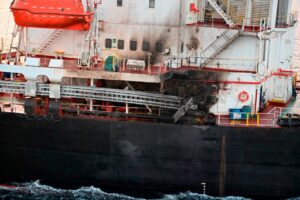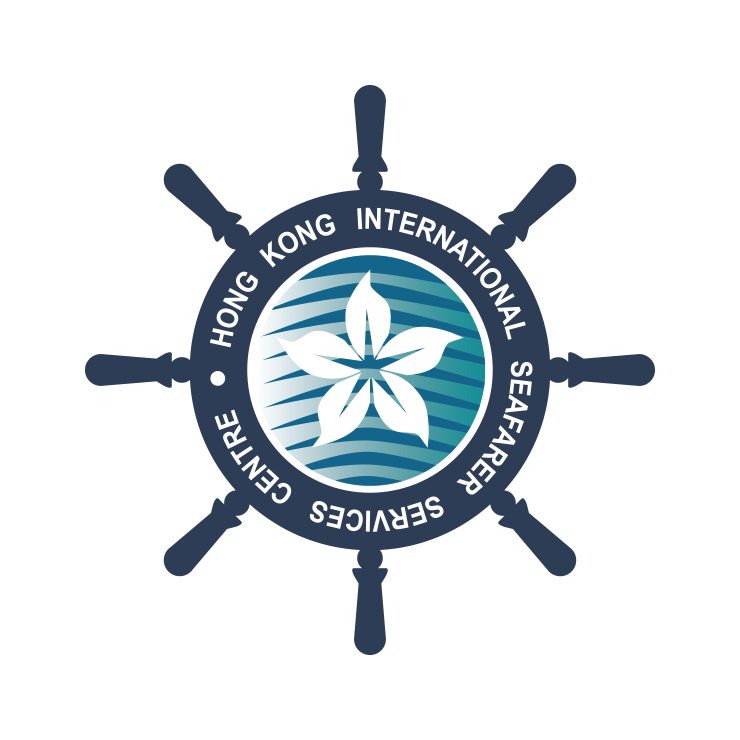红海之怒/Rage in the Red Sea

While shipping companies profit from the Red Sea crisis, seafarers are paying the price.
虽然航运公司从红海危机中获利,但海员却付出了代价。
去年十一月,当也门胡塞武装宣布,他们将在红海针对与以色列有联系的国际航运,当时很少人相信他们的袭击会持续逾八个月。
When the Houthis of Yemen announced that they would target Israeli-linked international shipping in the Red Sea in November last year, few would have believed that the turmoil of their attacks would be continuing eight months on.
胡塞武装一直坚称,他们的攻击(针对许多国家的船只)将持续下去,直到以色列对加萨走廊的入侵结束。这就是为什么国际运输工人联盟(ITF)要求寻找解决方案,从根本解决问题。
The Houthis have always been adamant that their attacks – which have targeted the ships of many nations – will continue until Israel’s invasion of the Gaza Strip ends. That is why the International Transport Workers’ Federation (ITF) demands a solution which tackles the root cause of this problem head-on.
「所有关心海员生命 – 或关心保障工人安全的全球供应链 – 的人都必须呼吁加萨永久停火,和平是结束红海船只袭击的最佳方式。」ITF秘书长 Stephen Cotton今年二月表示。
“All those who care about the lives of seafarers – or a global supply chain that keeps its workers safe – must call for a permanent ceasefire in Gaza. Peace is the best way to end the attacks on ships in the Red Sea,” ITF general secretary Stephen Cotton said in February this year.
除了在以色列和巴勒斯坦实现和平之外,还有一个简单而直接的解决方案可以保护海员免受非他们造成的冲突的影响:停止航经红海。尽管部分大公司已经暂停航经红海,但仍有太多船只冒险──意味着不少海员的生命仍面临危机。
Outside of reaching peace in Israel and Palestine, there remains a simple and immediate solution to protect seafarers from a conflict not of their making: stop transiting the Red Sea. But while major companies may have stopped transiting the Red Sea, far too many ships still do – which means seafarers’ lives are being put at risk.
至今,胡塞武装已对船只发动七十多次攻击,其中两艘船只被击沉,一艘被扣押。伤亡包括三月在True Confidence 号上遇难的三名海员、六月在Tutor号上遇难的一名海员、十一月Galaxy Leader号上十七名船员在也门被扣押已至少八个月,还有四月時廿五名MSC Aries号船员于霍尔木兹海峡成为人质被扣押。
To date, there have been more than 70 attacks on ships by the Houthis since November, with two vessels sunk and one seized. The human cost includes three seafarers killed aboard the True Confidence in March, one killed on the Tutor in June, 17 crew from the Galaxy Leader seized in November and still being held hostage in Yemen eight months on, and 25 crew taken hostage when the MSC Aries was seized in the Straits of Hormuz in April.
但不少人未意识到遇害海员及其家人每天面对的伤痛,仍要踏上穿越红海的危险旅程,更担心自己无法毫发无损地回到亲人身边。
But what is left largely unrecognised is the daily trauma faced by the many seafarers – and their families back home – who still embark on perilous journeys through the Red Sea, fearful that they will not return home to their loved ones unharmed.
自从这场危机爆发以来,ITF一直努力不懈地保护海员。值得注意的是,集体谈判协议中有关红海的「战争行动区」自四月起扩大,这是我们透过国际谈判论坛提出要求的直接结果,该论坛汇集船东和工会进行集体谈判。
Since the start of this crisis, the ITF has worked tirelessly to protect seafarers. Notably, the ‘Warlike Operations Area’ in the Red Sea was expanded in April as a direct result of our demand made via the International Bargaining Forum, a group that brings together ship owners and unions to negotiate collective bargaining agreements.
这意味着 ITF 协议涵盖的任何海员(全球方便旗船上共有近卅六万名海员)均拥有拒绝在该区域航行的合约权利,同时有权要求遣返,费用由船东承担。现在,包括全球最大海员供应国家如菲律宾和印度等政府,也采取了类似政策。
This means that any seafarer covered by an ITF agreement – a total of nearly 360,000 seafarers worldwide on flag of convenience ships – have the contractual right to refuse to sail in the Area, alongside the right to request repatriation at the ship owner’s expense. And similar policies have now been adopted by governments, including the Philippines, one of the world’s largest suppliers of seafarers, and India.
不过,尽管这些努力为许多海员提供了避开航经红海的方法,但许多海员仍要面对工作需要,为要寄钱回家给家人而冒险。
But while these efforts give many seafarers a means to avoid the Red Sea, many are still confronted by their fundamental need to work – and, more often than not, send money back home to their families.
ITF对于政府、航运公司和船旗国需要采取的行动的立场很明确:航运公司必须透过改变船舶航线来表明其对海员的承诺。
The ITF position on what needs to be done by governments, shipping companies and flag states is clear: Shipping companies must demonstrate their commitment to their seafarers by diverting their ships.
船旗国应为确保船上海员安全工作环境,必须指示公司改变船舶航线。
Flag states, which are responsible for assuring a safe working environment for seafarers on their vessels, must instruct companies to divert their ships.
各国政府必须加强海军力量,保护仍在过境的商船,并采取更多措施协调努力,保护在该地区航行或途经的海员。
Governments must strengthen naval forces protecting any merchant ships that do still transit and do much more to co-ordinate their efforts to protect seafarers sailing in or through the Area.
正如《劳合社名单》在今年国际海事组织世界海员日指出,「表达声援和谴责并不能拯救生命。惟有行动能够。」
As Lloyd’s List rightly noted on the International Maritime Organization’s Day of the Seafarer this year, “expressions of solidarity and condemnation don’t save lives. Actions do.”
事实上,如果我们确实将海员视为全球经济的「关键工人」,就应采取协调一致的行动来保护他们。
Indeed, if we are to treat seafarers as the ‘key workers’ of the global economy that they truly are, no less than concerted, co-ordinated action to protect them will suffice.
如果无法保证安全地通过红海,公司就有义务采取行动:货物交付不值得牺牲海员的生命,亦不应因通过红海而将平民海员置于危机之中。
If safe transit through the Red Sea cannot be guaranteed, companies have a duty to act: delivery windows are not worth seafarers’ lives, and civilian seafarers must not be put in the line of fire by transiting the Red Sea.
资料来源: https://www.itfseafarers.org/en/news/rage-red-sea

